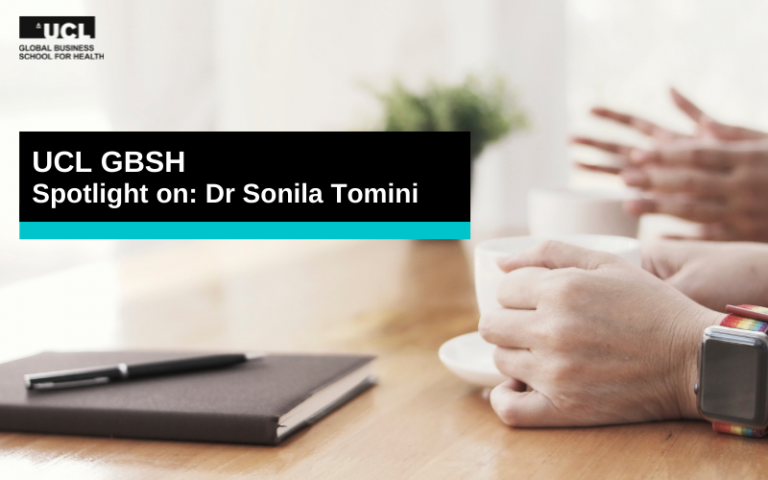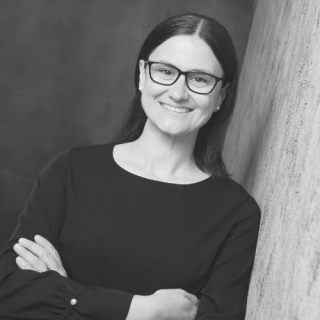Spotlight On: Dr Sonila Tomini, Lecturer in Health Economics
1 June 2022
We speak to Dr Sonila Tomini, Lecturer in Health Economics at UCL's Global Business School for Health, about her career, academic interests and why she is excited to be joining the UCL GBSH team.

Tell me more about your background – It would be great to find out more about your education and career so far.
I have a background in economics, health economics and public policy analysis. This gives me the opportunity to approach any health decision problems from a wider perspective looking not simply at the allocation of scarce resources but considering also issues such as equity and governance. I have defended my PhD in The Netherlands, Maastricht University, in 2011 and from that time I have held several positions as a researcher, lecturer and dissertation advisor at Maastricht University, Liege University, Liverpool University Laureate Online Education Programme, and from 2019, at University College London (Department of Applied Health Research).
Teaching at different universities and leading different modules both in the UK and other countries has not only put me in direct contact with the most current literature on topics related to health economics but also made me appreciate how students from various backgrounds get acquainted with economics, quantitative and evaluation techniques.
Why are you excited to be joining the UCL Global Business School for Health?
It is both a privilege and responsibility for me to work for the first world’s business school dedicated to health. Being a health economist, I fully understand the pressure that the increasing resource-demanding health care put on a country’s resources and the need to understand the principles of making informed decisions based on best practices of cost-effectiveness analysis. The business perspective it is inseparable from rethinking the health and health care challenges. Therefore, collaborating with the best academics and being able to contribute to a better understanding of today’s and tomorrow’s challenges is an additional motivational factor for me in joining UCL GBSH.
Teaching for the GBSH and UCL East will give me the opportunity to meet students that come from many different countries and different backgrounds. I taught before to international students at the United Nations University in Maastricht and could observe how my teaching contributes not only to the local community but also globally, and now I have the opportunity to do this again in London.
What are you most excited to teach the first cohort of UCL GBSH students?
First, I am very excited to have the opportunity to meet students from all around the world and to be able to share my knowledge with them. Guiding the students in benefiting as much as possible from the lectures, readings and seminars is only part of my teaching tasks. The other part is to encourage them to be critical of what they read, get involved in discussing the topics as well as use their experience and knowledge in improving the health care sector.
I will coordinate a module on Pharmacoeconomics and one on ‘Value Assessment, Decision Making and Sustainable Healthcare’. Both modules are relevant and touch upon the financial pressures that our society is facing nowadays in financing health care. They build on the knowledge of economic evaluation and healthcare financing to provide students with the skills to make informed decisions that are sustainable and value maximising. Using real cases and inviting speakers to speak on practical aspects will provide the students with the opportunity to face the real problems that the healthcare system is facing and make them think about how to deal with them.
Is healthcare management an area more business schools should be exploring? If so, why?
The recent pandemic has taught us more than ever how valuable are the limited health care resources and how efficient use of them can contribute to maximising the access and benefits to patients and society. The pandemic has also taught us that the management of health care organisations, especially in times of great need, poses a lot of challenges that are not easily overcome. The overall management and leadership of both public and private healthcare organisations have therefore a pivotal role and business schools should teach these much-demanded skills.
We teach our students that the demand for health care is not a direct demand, as happens with most other commodities, but rather derived from the demand for better health. As such, the economics of health care is a bit more complex than the economics of other commodities. Country contexts also play a great role in how health care is marketed and provided with most countries having a mix of publicly provided and privately provided health care. The way health care organisations are managed should attract much more attention when we study the performance of these organisations or when we teach the theories of management. Business schools can contribute to this by designing and delivering modules that familiarise the health care professionals with the challenges as well as provide them with the right tools to address those challenges.
What contribution do you want to bring to the school and future students?
I am hoping that I will be able to share my experience in addressing public health challenges in both developed and developing countries. Most of the topics in health economics have a quantitative nature and, as such, are not equally approachable to all backgrounds: making them more practical and easier to understand for all students is one of my main aims in teaching.
My next aim is to get students from different countries and cultures involved in the teaching process, simulate the discussions and exchange of experience and provide as much feedback as possible. Being able to have the students' opinions and feedback and reflect that in my teaching will also lead to increased quality of the modules and greatly impact the level of knowledge sharing and the overall experience when studying at UCL GBSH.
 Close
Close


